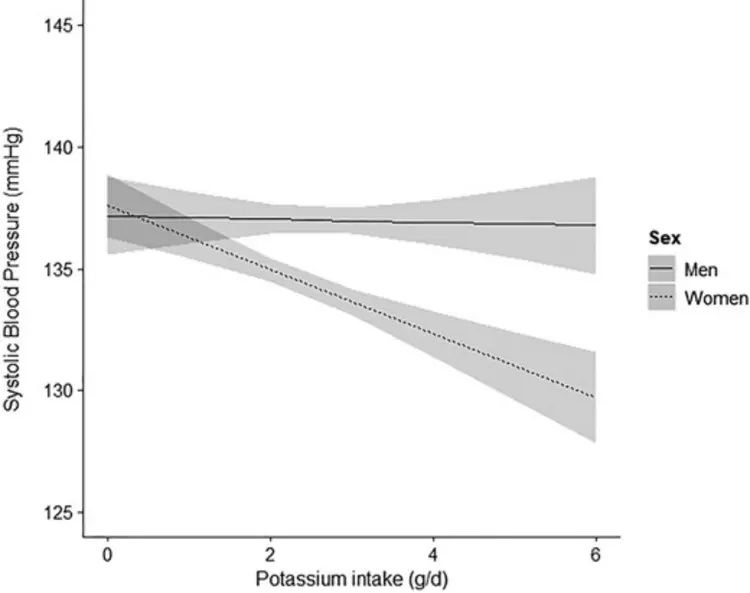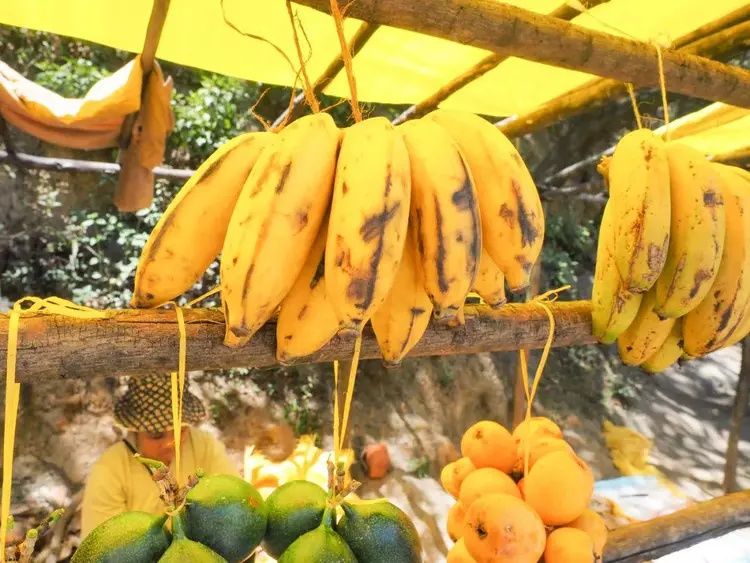[Source: Shanghai Putuo]
Recently, the European Heart Journal published a study on “Eating more potassium-rich foods to improve heart health” paper. Studies have shown that eating more potassium-rich foods can prevent heart disease.
Over a nearly 20-year follow-up period, those with the highest potassium intake were associated with a 13% lower risk of cardiovascular events compared with those with the lowest potassium intake in the overall population. The risk of developing or recurring cardiovascular disease was reduced by 11% for women and 7% for men.

Association between potassium intake and systolic blood pressure
In contrast to high sodium intake In women, eating more potassium-containing foods can reduce blood pressure, and every 1 gram of potassium per day reduces systolic blood pressure by 2.4 mmHg. But this association was not found in men.
Eating more potassium-rich foods may help prevent heart disease, and women may benefit more, researchers say. Even foreign media reported on the topic “A banana a day can prevent high blood pressure and heart disease in women”. But, are you eating the right banana? Let’s take a look together↓
You need to know the truth about bananas!
1. Eating bananas for laxative effect is not necessarily good
Many people often choose to eat bananas for laxative, but the effect is not necessarily good it is good. Due to the influence of origin and transportation, bananas often embark on journeys to various parts of the country before they are fully ripe. Incompletely ripe bananas contain more tannic acid, which has an astringent effect, but cannot be laxative. In addition to waiting for the bananas to mature naturally, you can quickly eat “ripe” bananas by steaming them in a pot for 10 minutes, adding them to porridge and cooking them.

data map
2. People with diabetes and kidney disease should control their intake
span>
Although bananas are good, don’t be greedy. Nutritionists said that the general population recommends 200 to 350 grams of fruit per day. For athletes and other people with high energy consumption, the intake can be appropriately increased according to the specific situation. Bananas have a high glycemic index and are not suitable for diabetics. Because bananas are high in potassium, people with kidney disease need to control their intake. In the theory of traditional Chinese medicine, bananas are sweet and cold in nature, and people with weak spleen and stomach should eat less to avoid diarrhea.
3. Stabilize blood pressure and prevent cardiovascular disease
Banana is very nutritious, rich in potassium and magnesium, which can prevent cardiovascular disease. Potassium in the human body can maintain the coordination of normal myocardial contraction, maintain normal neuromuscular excitability, and coordinate myocardial contraction and relaxation. When potassium is deficient in the body, irregular heartbeat, tachycardia, and drop in blood pressure can occur. A banana contains about 400 mg of potassium, which can maintain stable blood pressure and prevent cardiovascular disease.
4. Can reduce fatigue and relieve depression
Banana is also known as “happy food”. Studies have confirmed that the pantothenic acid and other ingredients contained in bananas are the “happy hormones” of the human body, which can reduce psychological pressure, ease tension, improve work efficiency, reduce fatigue, and relieve depression.
Banana also helps the brain to make a chemical in the brain called serotonin, which stimulates the nervous system, brings joy, calm and sleepy signals to people, relieves depression and emotional distress .
5. Black spots appear on the banana peel and eat with confidence
Banana is a tropical fruit and should not be stored in the refrigerator. Put it in a plastic bag, exhaust the air in the bag, and store it at room temperature. If the banana is left for too long, the oxidized carbon contained in the epidermal cells will be easily oxidized to black when exposed to oxygen, resulting in black spots on the banana peel. In addition, during the ripening process of bananas, anthracnose can be caused by C. spinosa, and black spots will appear on the banana skin, but it will not cause disease. As long as the inner pulp is intact after peeling, it can be eaten with confidence.
Information: Health Times
Editor: Wu Xingting
Disclaimer: The copyright of this article belongs to the original author, if there is a source If it is wrong or violates your legal rights, you can contact us by email, and we will deal with it in time. Email address: [email protected]